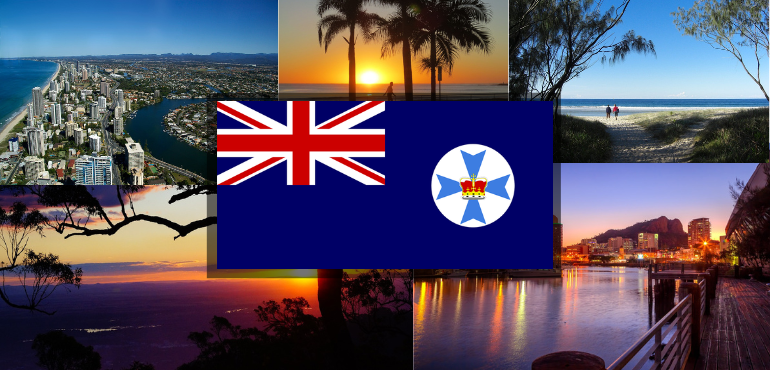Queensland, often called as the “Sunshine State,” is one of Australia’s most iconic regions. With its diverse landscapes, rich history, and vibrant culture, Queensland offers something for everyone, from tropical rainforests to bustling urban centres.
I will provide an in-depth look at Queensland, covering its geography, natural attractions, cities, economy, culture, education, transportation, and future prospects.
Things We Need to Know about Queensland
Let us explore and travel to Queensland through the concise but comprehensive collection of information about this great state in Australia.
Geography and Climate
Location and Size
- Location: Queensland is located in northeastern Australia, bordered by the Coral Sea and Pacific Ocean to the east, the Northern Territory to the west, South Australia to the southwest, and New South Wales to the south.
- Size: Approximately 1.853 million square kilometres, making it the second-largest state in Australia after Western Australia. Its extensive coastline stretches over 7,400 kilometres.
Climate Zones
Queensland’s vast size results in a variety of climate zones, each contributing to the state’s unique environments:
- Tropical Climate: Found in the northern regions, including Cairns and the Great Barrier Reef, characterised by hot, humid summers and mild, dry winters.
- Subtropical Climate: Common in the southeast, including Brisbane and the Gold Coast, with warm, humid summers and mild winters.
- Arid and Semi-Arid: Predominates the western interior regions, featuring hot, dry summers and cooler winters.
Natural Attractions
Great Barrier Reef
- Description: The world’s largest coral reef system, spanning over 2,300 kilometres and comprising around 2,900 individual reefs and 900 islands.
- Activities: Snorkeling, scuba diving, marine life tours, and reef cruises.
- Significance: A UNESCO World Heritage site and one of the seven natural wonders of the world, home to an incredible diversity of marine life, including over 1,500 species of fish, 411 types of hard coral, and various marine mammals and birds.
Daintree Rainforest
- Description: One of the oldest rainforests in the world, estimated to be around 135 million years old, covering approximately 1,200 square kilometres.
- Activities: Guided walks, wildlife spotting, eco-tours, and river cruises.
- Significance: Rich biodiversity with numerous plant and animal species found nowhere else on Earth. It holds significant cultural importance to the local Aboriginal people.
Whitsunday Islands
- Description: A group of 74 islands located in the heart of the Great Barrier Reef, known for their stunning natural beauty.
- Activities: Sailing, beachcombing, snorkelling, diving, and luxury resort stays.
- Highlights: Whitehaven Beach, known for its pure silica sand, and the Heart Reef, a naturally formed coral reef in the shape of a heart.
Cities and Urban Centers
Brisbane
- Description: The capital city of Queensland and the third-largest city in Australia.
- Population: Approximately 2.4 million residents.
- Key Attractions:
- South Bank Parklands: A vibrant cultural and recreational precinct with gardens, restaurants, and a man-made beach.
- Queensland Museum: Offers exhibits on natural history, cultural heritage, and science.
- Brisbane River: Cruises and riverfront activities provide scenic views of the city.
- Lone Pine Koala Sanctuary: The world’s oldest and largest koala sanctuary, offering interactive wildlife experiences.
- Mount Coot-tha Lookout: Provides panoramic views of Brisbane and its surroundings.
Gold Coast
- Description: Known for its stunning beaches, surfing spots, and vibrant nightlife.
- Population: Over 700,000 residents.
- Key Attractions:
- Surfers Paradise: A famous beach and entertainment area.
- Theme Parks: Including Dreamworld, Sea World, Warner Bros. Movie World, and Wet’n’Wild.
- Shopping Centers: Pacific Fair, Harbour Town Outlet Shopping Centre, and Robina Town Centre.
- Natural Attractions: Lamington National Park, offering rainforests, waterfalls, and hiking trails.
- Cultural Venues: Home of the Arts (HOTA), which hosts various performances, exhibitions, and festivals.
Cairns
- Description: A gateway to the Great Barrier Reef and the Daintree Rainforest, offering a tropical lifestyle.
- Population: Approximately 150,000 residents.
- Key Attractions:
- Reef Tours: Daily excursions to explore the Great Barrier Reef.
- Kuranda Scenic Railway: A historic railway offering scenic journeys through the rainforest.
- Cairns Esplanade: A waterfront area with a lagoon, boardwalks, and recreational facilities.
- Skyrail Rainforest Cableway: Provides a unique perspective of the rainforest canopy.
- Tjapukai Aboriginal Cultural Park: Offers insights into Indigenous culture through performances and interactive experiences.
Townsville
- Description: A major regional city in northern Queensland, known for its military base and tropical climate.
- Population: Approximately 195,000 residents.
- Key Attractions:
- The Strand: A beachfront promenade with parks, water playgrounds, and dining options.
- Reef HQ Aquarium: The world’s largest living coral reef aquarium.
- Magnetic Island: Accessible by ferry, offering beautiful beaches, hiking trails, and wildlife.
- Castle Hill: A prominent landmark providing panoramic views of the city and coastline.
Sunshine Coast
- Description: A coastal region known for its laid-back atmosphere, beautiful beaches, and natural attractions.
- Population: Approximately 330,000 residents.
- Key Attractions:
- Noosa National Park: Offers coastal walks, wildlife spotting, and stunning ocean views.
- Australia Zoo: Founded by Steve Irwin, home to a wide range of animals and conservation programs.
- Mooloolaba Beach: A popular beach with calm waters, ideal for families and water activities.
- Eumundi Markets: A renowned artisan market featuring local crafts, food, and entertainment.
Economy
Key Industries
Queensland’s economy is diverse, with several key industries driving growth and development:
- Tourism: A significant contributor due to natural attractions like the Great Barrier Reef, Daintree Rainforest, and vibrant cities.
- Agriculture: Major producer of sugar cane, beef, tropical fruits, cotton, and various crops.
- Mining: Rich in resources such as coal, natural gas, bauxite, and precious metals.
Economic Growth
- Innovation and Technology: Emerging sectors include biotechnology, renewable energy, and advanced manufacturing.
- Infrastructure: Ongoing investments in transport, urban development, and digital infrastructure aim to support sustainable growth.
Culture and Heritage
Indigenous Heritage
- Traditional Owners: Various Aboriginal and Torres Strait Islander groups, each with their unique languages, customs, and traditions.
- Cultural Sites:
- Carnarvon Gorge: Features ancient rock art and significant Aboriginal cultural sites.
- Laura Aboriginal Dance Festival: Celebrates traditional dance and music.
- Art Galleries: Display Indigenous art, including the Queensland Art Gallery and Gallery of Modern Art (QAGOMA).
Festivals and Events
Queensland hosts a range of festivals and events that showcase its cultural diversity and vibrant community spirit:
- Brisbane Festival: An annual arts festival featuring performances, installations, and fireworks.
- Cairns Indigenous Art Fair: Celebrates Indigenous art and culture through exhibitions, performances, and workshops.
- Gold Coast 600: A popular motorsport event that attracts racing enthusiasts from around the world.
Education and Research
Major Universities
Queensland is home to several prestigious universities known for their research and academic excellence:
- University of Queensland (UQ): Ranked among the world’s top universities, offering a wide range of programs and strong research capabilities.
- Queensland University of Technology (QUT): Known for its practical, industry-focused courses and research innovation.
- Griffith University: Renowned for its diverse courses, strong research initiatives, and commitment to sustainability.
Research Institutes
Queensland is a hub for scientific research and innovation:
- CSIRO (Commonwealth Scientific and Industrial Research Organisation): Engages in cutting-edge research across various fields.
- Australian Institute of Marine Science (AIMS): Focuses on marine biology, conservation, and sustainable use of marine resources.
Transportation
Airports
Queensland’s major airports facilitate domestic and international travel:
- Brisbane Airport: The primary international gateway, with extensive connections to global destinations.
- Cairns Airport: Serves as a major hub for northern Queensland, with flights to major Australian cities and international destinations.
Public Transport
Queensland has a comprehensive public transport network:
- Rail Network: An extensive system connecting major cities, regional areas, and remote communities.
- Bus Services: Provide convenient travel within cities and towns, as well as intercity connections.
- Ferry Services: Operate in coastal regions and islands, offering scenic and practical transportation options.
Challenges and Future Prospects
Environmental Concerns
Queensland faces several environmental challenges that require sustainable solutions:
- Climate Change: Impacting coral reefs, coastal areas, and natural habitats. Efforts are ongoing to mitigate and adapt to these changes.
- Urbanization: Balancing development with sustainability to protect natural resources and maintain quality of life.
Economic Diversification
To ensure long-term prosperity, Queensland is focusing on diversifying its economy:
- Innovation: Investing in technology, green industries, and research to drive future growth.
- Skills Development: Enhancing education and training programs to meet the demands of emerging industries and a changing job market.
Queensland is a dynamic state with a rich tapestry of natural beauty, cultural heritage, and economic potential.
From its stunning coastlines and ancient rainforests to its vibrant cities and pioneering industries, Queensland continues to captivate and inspire residents and visitors alike.
Whether exploring its diverse ecosystems or engaging with its innovative sectors, Queensland offers endless opportunities for discovery and growth.



















